African History through the Lens of Economics, an innovative, open-access, online course which attracted over 27,000 people from across the world, explored how history has shaped and continues to influence domestic policies and economic development in Africa.
A reflective essay by David Jones, MBA 2022 graduate from London Business School and intern at the Wheeler Institute.
After working with the Wheeler Institute last summer on a Development Impact Platform project with the Zambian Medicines and Medical Supplies Agency (ZAMMSA) and returning as a content generation intern at the beginning of this year, I was pleased to be able to spend my time supporting the Wheeler Institute’s course, African History through the Lens of Economics. More than 27,000 people from over 160 countries and 1,000 universities and academic institutions participated in the course, which addressed subjects including political and social organisation, the slave trades and the “Scramble for Africa”, colonisation, political distortions and independence movements, and social mobility. It also explained important recent datasets including geospatial data, archival material, anthropological maps and social histories and how these are being used by scholars; and highlighted inter-disciplinary research in areas such as tax policies, forced and prison labour, colonial administrations and Christian missionary activity. It is hard to summarise a course of such interest and diversity in a short essay, so in what follows I will highlight a few themes that stood out for me.
“Put your feet in Africa and look out”
In the first lecture in the series, Ancient Africa in World Economic History, Christopher Ehret emphasised not only the importance of African societies to world economic developments, but also the diversity of the continent, a fact that is often under-appreciated by non-Africans. We learned that the earliest agricultural practices emerged in approximately a dozen different parts of the world, including in three separate, independent regions of Africa, and that until relatively recently the continent had contributed to technological and agricultural advances as part of extensive global networks of trade and exchange. This important long-run economic history of the continent was further discussed in the first special lecture, delivered by Morten Jerven, Ewout Frankema and Marlous van Waijenburg and covering population and GDP growth, trade and wages through the periods of the slave trade and colonialism, and taxation. Chris Ehret’s lecture concluded that Africa has not been a continent cut off from the rest of the world, isolated and unchanging, but that it has through most of history been a region that contributed to and participated in the long-term developments of human history, and Ehret encouraged us to ‘put our feet in Africa’ and consider the world from that perspective, a piece of advice which was referred to regularly by later speakers.
Mis-perception by Europeans
Despite these exhortations, the theme of Western misunderstanding of the African continent recurred throughout the series. It was picked up in detail, for example, in the session on social structure with Nathan Nunn and the final plenary with Joe Henrich. Both these lectures covered the implications of Henrich’s thesis about the uncommon combination of beliefs, norms and institutions that developed in medieval Europe and were exported to its possessions in the Americas and Australia, and that have shaped Western engagement with the rest of the world. All too frequently, their WEIRD (Western, Educated, Industrialised, Rich and Democratic) perspective has led Europeans to assume African political and social practices are more unusual than they are when viewed in a global context. Nunn gave interesting examples of the misinterpretations of the bride price and matrilineal kinship structures by early anthropologists, practices that have subsequently been proven to be less paradoxical and indeed more beneficial than first thought.
Many of these biases and received assumptions are now being investigated in more detail by researchers. Awa Ambra Seck and Amma Panin, for example, gave an overview of their work respectively on how policies designed with reference to a particular, Western cultural setting can shape African cultural practices, and on the social and cultural considerations around the increasingly large level of donations to African Pentecostal churches. Similarly, in a later lecture in the series, Elias Papaioannou looked at the influence of infrastructure investments on the economic development of the continent. The benefits of such investments are a subject of debate among economists, including Roland Pongou, who delivered a special lecture dedicated to the question of whether investments in railroads led to higher capital accumulation and industrialisation. Papaioannou, however, reminded us that irrespective of their relative effect on development, the overall impact was small because the scale of the investment was so limited, contrary to many visions of European railroads criss-crossing the continent from Cape to Cairo.
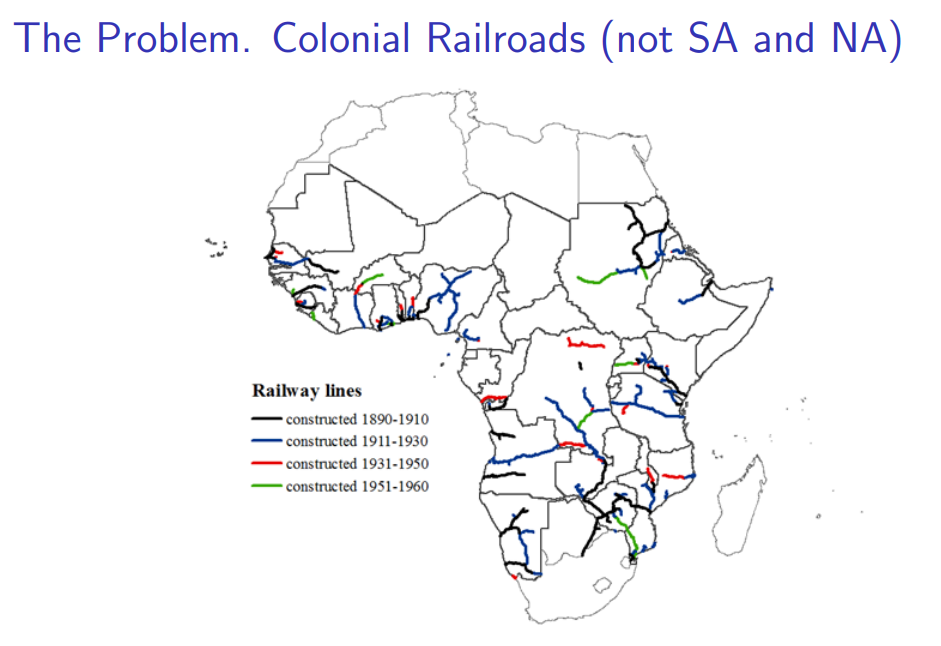
New data and techniques
Throughout the series, we were also given an insight into some of the new and exciting datasets being used by economists seeking to understand African development. It was interesting for me to learn of the widespread use being made of George Peter Murdock’s ethnographic atlas, published in the journal Ethnology between 1962 and 1980, and his ethnolinguistic map of Africa (from Africa, its peoples and their cultural history, 1959), later digitised by Nathan Nunn. These data have been used frequently, for example to understand precolonial political organisation and its impact on development, as discussed by Stelios Michalopoulos and Warren Whatley in the second lecture of the course and again by Elias Papaioannou in his session on colonisation and the artificiality of modern national borders. It is now a common technique, for example, to identify intra-ethnic variation in development, by looking at groups that have been subject to different colonial or post-colonial factors or to look at the experience of historically discrete ethnic groups within modern countries.
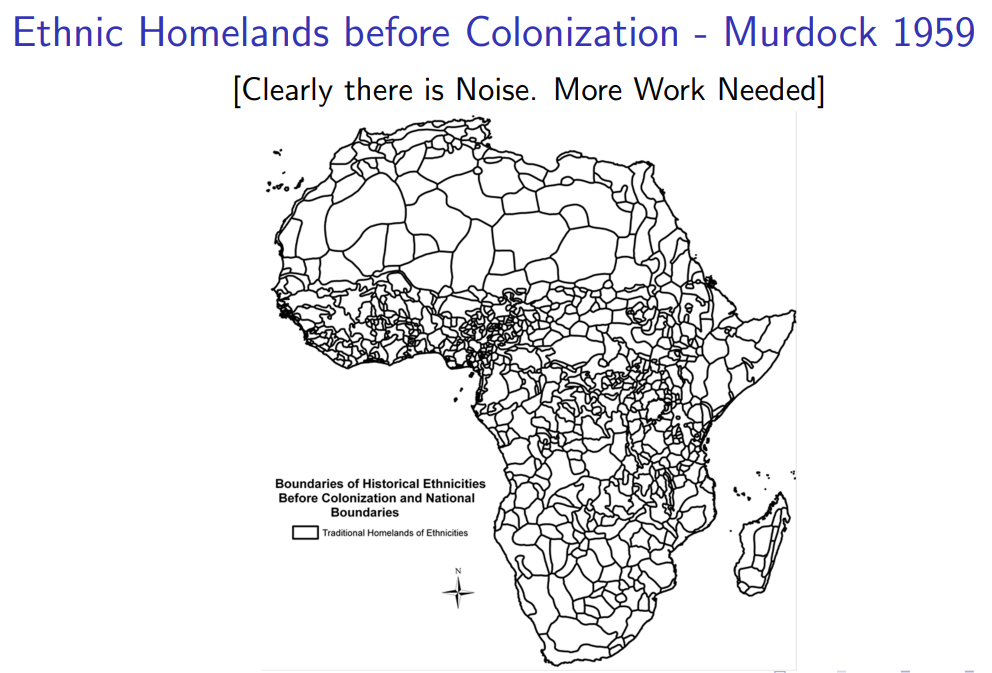
Tanner Regan’s lecture looked in more detail at some of the other popular, modern datasets, including fine-grained satellite images of night-time luminosity or construction; quantitative and qualitative survey responses (e.g. through Afrobarometer or USAID’s DHS); and conflict databases. These are exciting new resources for researchers, because they supplement official statistics and allow a more nuanced understanding of the heterogeneous nature of development across the continent, responding to Christopher Ehret’s prompt. James Fenske’s special lecture explained how he had used Murdock’s ethnic and geographic data alongside a variable for ‘ecological diversity’ based on White (1983) to investigate Bates’ theory that pre-colonial states were strongest where the gains of trade between different ecological zones were greatest. In the same lecture, Marcella Alsan described her creation of a Tse-Tse fly suitability index (TSI) from physiological calculations and historical climate data to investigate the development of subsistence agriculture in sub-Saharan Africa. These are just some of the precise, focused uses of data being pioneered by contemporary researchers.
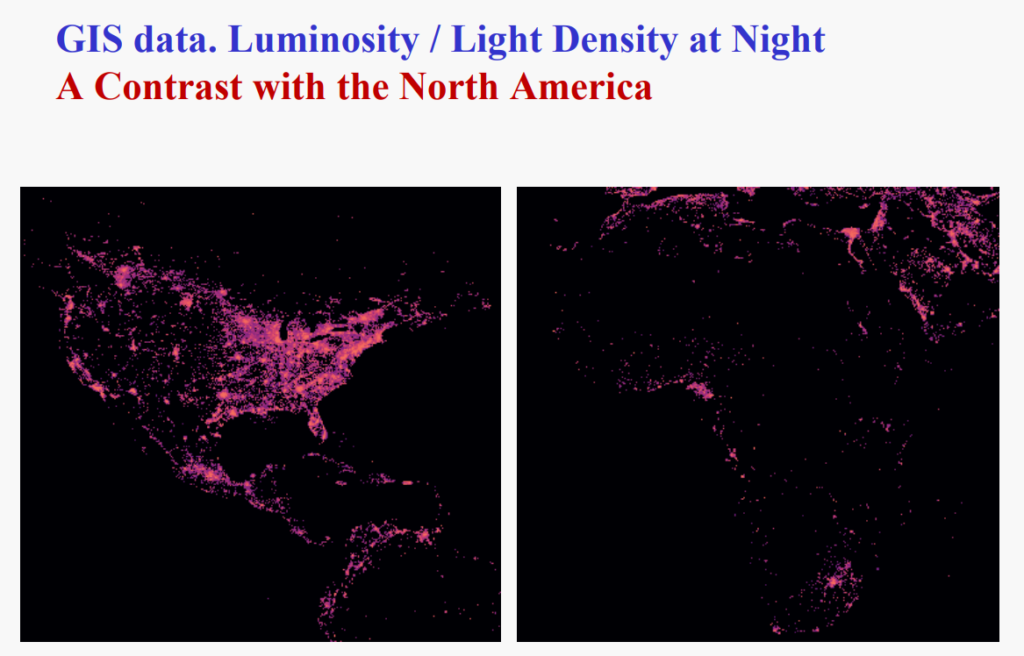
It became clear that much of the work of researchers involves the painstaking digitisation of original archival materials from a variety of sources, supplemented by advanced quantitative methods. For example, Nathan Nunn talked about his extensive research based on accounts in Sigismund Koelle’s Linguistic Inventory and shipping records to understand the magnitude and patterns of the African slave trades. In the related special lecture, Patrick Manning then explained his work using Bayesian statistics (at Harvard Dataverse) to estimate missing data on the scale of these slave trades and to supplement the archive-based work of Eltis at www.slavevoyages.org. Throughout the sessions we saw the impact that new datasets and approaches can have on investigating longstanding questions, and some of the common ways of creating useful digitised datasets from varied original sources.
Unpacking complex phenomena
As with the slave trades, researchers are engaged with complex, emotive phenomena that nonetheless need to be subjected to careful analysis to yield meaningful insights. Stelios Michalopoulos and Jeffrey Herbst explained what this involved in relation to the “Scramble for Africa” in the 1880s. At the time, Lord Salisbury explained that Europeans “ha[d] been giving away mountains and rivers and lakes to each other, only hindered by the small impediment that we never knew exactly where the mountains and rivers and lakes were.” The long-run effects of these decisions, which created artificial state boundaries, include ethnic fragmentation; conflict; unequal development; biased provision of public goods; and differing levels of political representation. Scholars perform careful comparisons of ethnic partitions across the continent and of split and non-split ethnicities within countries, making use of conflict databases, controlling for a wide range of variables and performing numerous robustness checks. In this way, they can form specific conclusions about the general processes, pointing to, for example, a strong link between ethnic partitioning and subsequent civil conflict and discrimination by the national government. Nonso Obikili extended this analysis with a specific focus on Nigeria, where multiple pre-colonial institutions, primarily based around ethnicity, were brought together into national-level colonial and post-colonial institutions that continue to be relevant to economic outcomes today. Johan Fourie examined how institutions established even before the Scramble persisted through the Apartheid era in South Africa and were only addressed in the early years of the current century, even then only temporarily.
In a similar vein, a series of three lectures focused on unpacking the influence of the colonial period on African development, both at the time and post-independence. Elias Papaioannou gave a detailed summary of the different aspects of colonisation that have been investigated by economists in recent years, including the influence of infrastructure and human capital investments; culture; economic structure; political institutions and economic power; geography and borders; and psychology. He again stressed the heterogenous impact of many of these factors, a further consideration for any researcher, and the benefits of an inter-disciplinary approach, encompassing political science, anthropology, law and medicine.
The need for precision and creativity
An example which I returned to through the course was Stelios Michalopoulos’s description of narrowing his focus on the influence of political institutions first by looking at partitioned ethnic homelands close to national boundaries and then by adding the consideration of proximity to capital cities as a proxy for influence by national-level institutions to move forward on causation. This balance of precision and creativity to understand the phenomena under consideration was a common theme throughout the course.
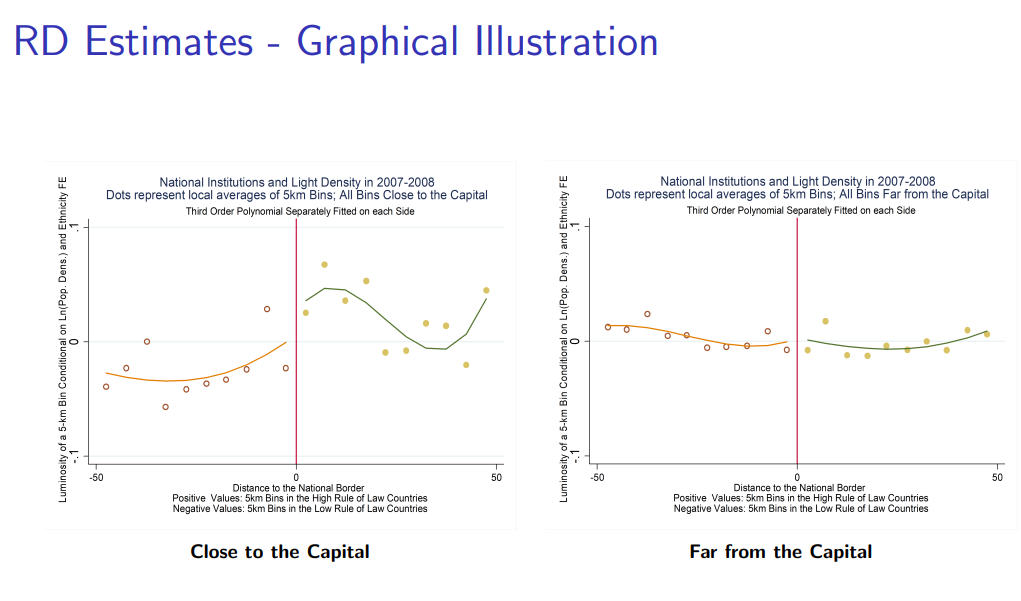
Leonard Wantchekon’s first lecture in the section of the course devoted to colonisation considered education and human capital, looking at levels of educational investment and enrolment in British and French colonies in West Africa, as well as the specific curricula studied. Etienne Le Rossignol, Catherine Guirkinger and Dozie Okoye considered the influence of Christian missions on education and social capital, on fertility and birth rates and on pre-existing social structures. The final main lecture in this section summarised some fascinating analyses of independence movements, categorised into rural insurgencies or urban protest movements, on post-independence measures of democracy and GDP growth and on political attitudes, as measured using survey data. As an example of the precision required to draw plausible conclusions on causation, district-level results in Wantechekon’s 2018 paper with Garcia-Ponte are controlled for rainfall, temperature, area, elevation, and distance to the nearest industrial town.
Further lectures focused on how scholars are using novel datasets and methodologies to derive more nuanced insights into the African experience. Belinda Archibong introduced her work on prison and forced labour in colonial Nigeria, which incorporates a valuation of the labour obtained by colonial administrations from the practice and identifies long-run effects on trust in institutions amongst groups with higher levels of incarceration. Jutta Bolt and Leigh Gardner are doing very interesting research into the impact of local government structures (encompassing a range of institutions controlled by a chief, a council or a combination of the two) on spending patterns on administration and public goods. Sarah Lowes has investigated the impact of colonial concessions on present day development, using DHS data and a geographic regression discontinuity approach based on whether survey locations were inside or outside concession boundaries. Education, health and wealth are all correlated with these boundaries. Finally, Giorgio Chiovelli’s presentation talked about a massive, multi-disciplinary effort to collect and digitise new sources of information about concessions and to utilise new geospatial data to understand their impact and legacy across more than twenty African countries. Together, they are creating a new institutional mapping of colonial Africa, detailing over 1,450 concession companies across several dimensions.
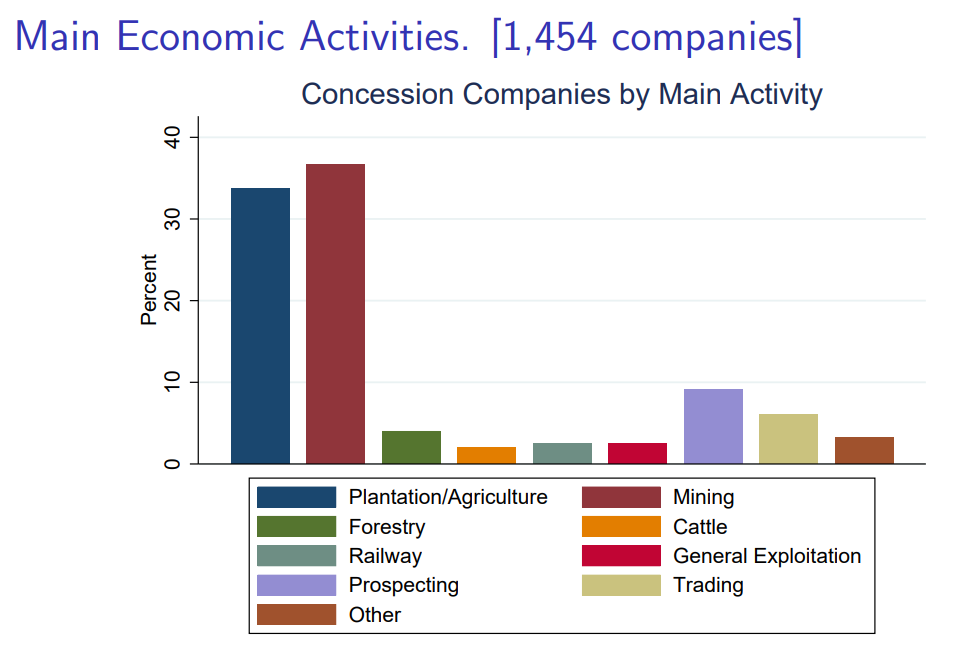
African experience and future
Given the heterogeneity of experience across the continent, the need to counter European biases and the value of identifying new datasets, it was welcome that the course emphasised the need to promote economic and political research by Africans. Two of the most memorable lectures in the series covered one prominent example of the benefits that result from the combination of close familiarity with the continent and high-quality academic training and work: Leonard Wantchekon himself.
The first was a lecture devoted to the life and career of Wantchekon; the second was the 31st Annual Kuznets Memorial Lecture, Political Distortions and Economic Development, delivered by Wantchekon. We heard how his career has included student political activism, several years in hiding in Benin’s shadow opposition government, a spell as a political prisoner, before an illustrious academic career in the U.S. and more recently back in Africa. One of his current priorities is the establishment and growth of the African School of Economics (ASE), with campuses in Benin, Cote d’Ivoire and Nigeria and joint programmes in the U.S., Canada, Nigeria, South Africa and Morocco. His ambition to create a group of young African academics is one that should be supported wholeheartedly.

Notwithstanding Wantchekon’s example of what can be achieved through exceptional ambition, dedication and ability, the course also considered the importance of education for economic development and social mobility in its final main lecture. David Laitin revealed how Africans remain disadvantaged by educational systems that use languages that are more distant from mother tongues than any other region. Leonard Wantchekon discussed an interesting research project into the effects of education on first, second and third generations in Benin, taking advantage of the almost-random pattern of colonial-era schools. Finally, Elias Papaioannou explored intergenerational mobility across the continent, finding that regional factors are important and that religious affiliation also plays a role in educational outcomes.
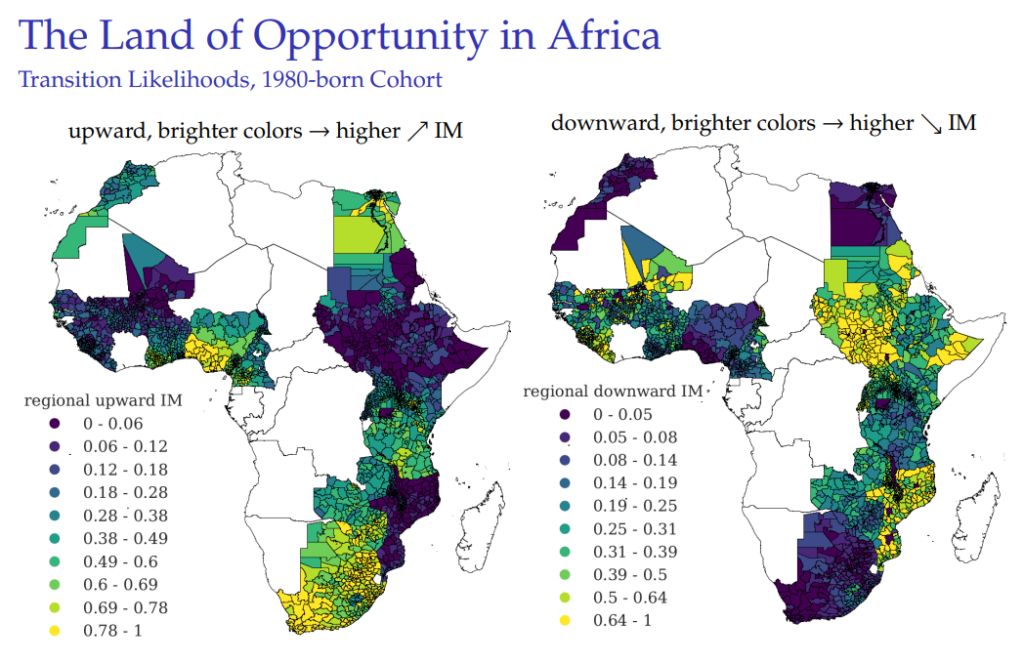
Two of the plenary sessions provided complementary perspectives on the recent past and possible futures for the continent. In the first, Bill Easterly, Célestin Monga and Mo Ibrahim talked about foreign aid. All identified that aid plays a larger role in the Western conception of the continent than in reality, where it represents a modest proportion of GDP and an inflow that is comparable to foreign direct investment (FDI), remittances and portfolio flows. Easterly argued that aid had failed, primarily due to poor incentives, lack of accountability and self-interest amongst both recipients and donors. Finally, Mo Ibrahim argued for improvements in governance and greater focus on multinational corporate responsibility, alongside increased investment in skills and young people. This theme was picked up by Jim Robinson and Chima Korieh in their discussion of Africa’s latent assets. They identified three strengths possessed by the continent as a whole: a traditional acceptance of achievement-based social mobility; a deeply-held skepticism of power, despite the well-publicised challenges of governance across the continent; and a cosmopolitan outlook encompassing distinct roles for women. Taken together, these sessions provided an optimistic conclusion to the series, suggesting that Africa’s young, dynamic and entrepreneurial populations are capable of seizing the opportunities of the twenty-first century to drive economic development across the continent.
Wheeler Institute objectives and staff
I would like to make a final observation about the ambition and dedication of the Wheeler Institute team in putting this series together. It was quite unlike any other offering at London Business School, engaging a huge audience from outside the institution, including over 20,000 registrations from Africa itself. Great credit must go to the main teaching faculty for imagining the course and bringing it to fruition with the help of such a high-quality group of guest speakers and collaborators. The Wheeler Institute staff, who worked incredibly hard to ensure the smooth running of the course and the lectures, accommodating far larger online audiences than had been anticipated and dealing with an enormous volume of Q&A in the sessions. The moderators and the teaching assistants for the dedicated research sessions ensured that this was a participative course and that students were able to have their questions addressed in detail.
The Wheeler Institute, supported by a major donation from Tony and Maureen Wheeler, seeks to improve lives through business, conducting rigorous research, forging communities of practice and shaping business education. This open online course achieved each of these aims. Over the past few months, I was privileged to be involved in a project that combined insights into cutting-edge research with the establishment of a large and engaged community of individuals from across the world, working together to identify evidence-based practices to address the challenges of economic development in Africa. As I reflect on the course and its content, I am optimistic about the continent’s future and I am confident that high-quality research that influences policy will be produced by a new generation of African researchers. I wholeheartedly congratulate the Institute and the teaching team for their achievement.
About the course
Over eleven weeks from February to April this year, the Wheeler Institute for Business and Development ran a free, open, online course, African History through the lens of Economics. This was the first such course run at London Business School, open to students and professionals worldwide with an interest in how history has shaped and continues to influence domestic policies and economic development.
The course, which was part-funded through the European Research Council Consolidator Grant and supported by the Centre for Economic Policy Research (CEPR) and the Structural Transformation and Economic Growth (STEG) Initiative, offered an unparalleled opportunity to hear from a wide range of academics at different stages of their careers and from different institutions. The main teaching team – Elias Papaioannou, Professor of Economics at the London Business School, Stelios Michalopoulos, Professor of Economics at Brown University, Nathan Nunn, Frederic E. Abbe Professor of Economics at Harvard University, and Leonard Wantchekon, Professor of Politics and International Affairs at Princeton University – was supplemented by nearly thirty guest speakers and twenty collaborators who acted as moderators and regular teaching assistants. Between them, this team delivered ten 90-minute main lectures, eleven additional special lectures and thrice-weekly Q&A sessions. At the end of the course, three plenary sessions were led by Bill Easterly, Célestin Monga, and Dr Mo Ibrahim, Chima Korieh and James Robinson, and Joe Henrich.
David Jones (MBA 2022) is a Classics graduate and has worked as a teacher in Malawi, an accountant at Deloitte and in the finance function at the Science Museum in London. He completed an internship with the Wheeler Institute’s Development Impact Platform in Zambia over summer 2021 and is now continuing as an intern for the Wheeler Institute, contributing to the creation of content that amplifies the role of business in improving lives.
